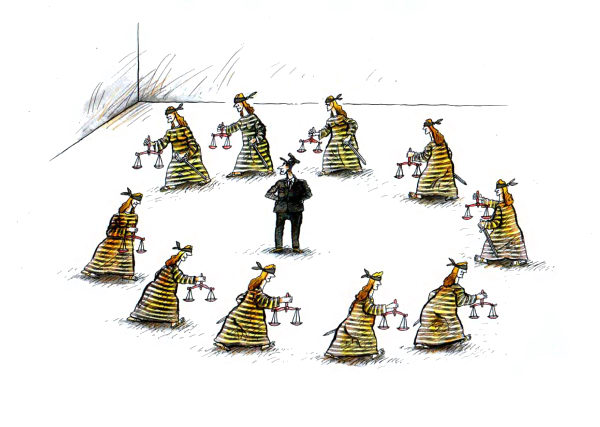Search
Democracy Links
Member's Off-site Blogs
still a hundred years ago .....

"My soul cries from all that I witnessed and endured. It does more than cry, it mourns continuously," said Black Panther Robert Hillary King, following his release from the infamous Louisiana State Penitentiary at Angola in 2001, after serving his last 29 years in continuous solitary confinement. King argues that slavery persists in Angola and other U.S. prisons, citing the 13th Amendment to the U.S. Constitution, which legalizes slavery in prisons as "a punishment for crime whereof the party shall have been duly convicted." King says: "You can be legally incarcerated but morally innocent."
Robert King, Albert Woodfox, and Herman Wallace are known as the "Angola Three," a trio of political prisoners whose supporters include Amnesty International, Archbishop Desmond Tutu, Congressman John Conyers, and the ACLU. Kgalema Mothlante, the President of South Africa says their case "has the potential of laying bare, exposing the shortcomings, in the entire U.S. system." Woodfox and Wallace are the two co-founders of the Angola chapter of the Black Panther Party (BPP) -- the only official prison chapter of the BPP. Both convicted in the highly contested stabbing death of white prison guard Brent Miller, Woodfox and Wallace have now spent over 36 years in solitary confinement.
The joint federal civil rights lawsuit of King, Woodfox, and Wallace, alleging that their time in solitary confinement is "cruel and unusual punishment," will go to trial any month in Baton Rouge, at the U.S. Middle District Court. Herman Wallace's appeal against his murder conviction is currently pending in the Louisiana Supreme Court, and on March 18, he was transferred to the Hunt Correctional Facility in St. Gabrielo, Louisiana, where he remains in solitary confinement. On March 2, the U.S. Fifth Circuit Court heard oral arguments regarding Albert Woodfox's conviction, after the Louisiana Attorney General appealed a lower court's ruling that overturned the conviction.An 18,000-acre former slave plantation in rural Louisiana, Angola is the largest prison in the U.S. Today, with African Americans composing over 75% of Angola's 5,108 prisoners, prison guards known as "free men," a forced 40-hour workweek, and four cents an hour as minimum wage, the resemblance to antebellum U.S. slavery is striking. In the early 1970s, it was even worse, as prisoners were forced to work 96-hour weeks (16 hours a day/six days a week) with two cents an hour as minimum wage. Officially considered (according to its own website) the "Bloodiest Prison in the South" at this time, violence from guards and between prisoners was endemic. Prison authorities sanctioned prisoner rape, and according to former Prison Warden Murray Henderson, the prison guards actually helped facilitate a brutal system of sexual slavery where the younger and physically weaker prisoners were bought and sold into submission. As part of the notorious "inmate trusty guard" system, responsible for killing 40 prisoners and seriously maiming 350 between 1972-75, some prisoners were given state-issued weapons and ordered to enforce this sexual slavery, as well as the prison's many other injustices. Life at Angola was living hell -- a 20th century slave plantation.
http://www.alternet.org/rights/139222/the_angola_three%3A_torture_in_our_own_backyard/
- By John Richardson at 2 May 2009 - 7:06pm
- John Richardson's blog
- Login or register to post comments
Recent comments
3 hours 16 min ago
6 hours 36 min ago
10 hours 43 min ago
15 hours 58 min ago
16 hours 1 min ago
18 hours 10 min ago
18 hours 41 min ago
1 day 14 hours ago
1 day 16 hours ago
1 day 16 hours ago